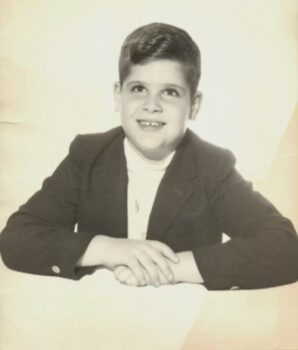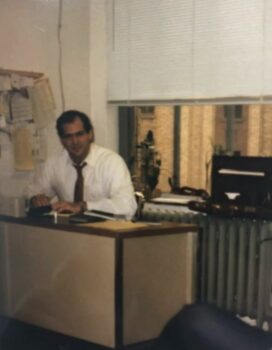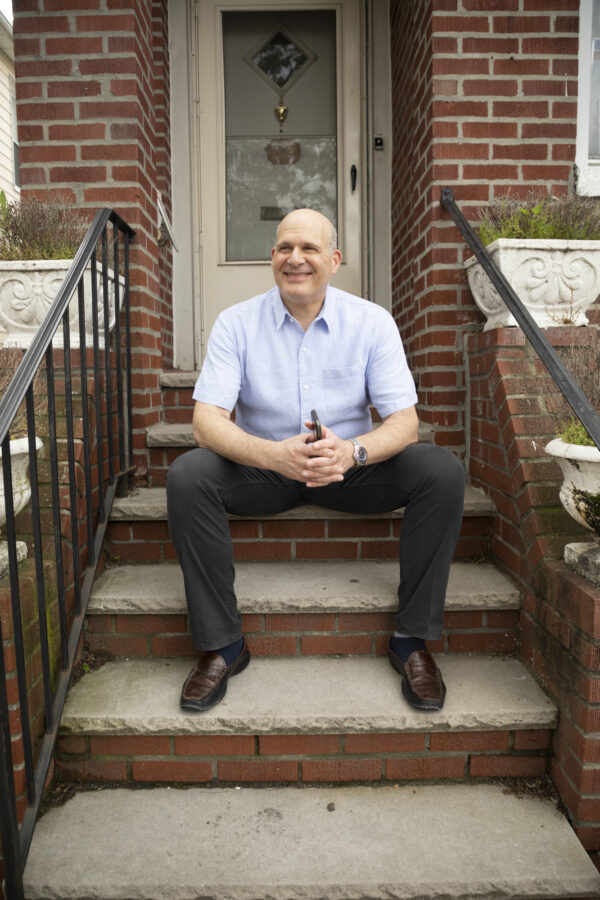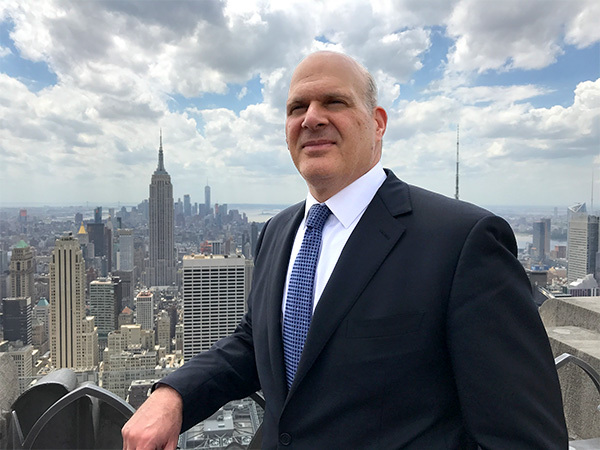Growing up, the only person Charles Mizrahi knew on Wall Street was an uncle who waited tables in the New York Stock Exchange dining room.
“My father was a warehouse manager, and the block I lived on in Brooklyn was as working-class as you can get,” he said. “Three cab drivers on the block, security guards, sanitation workers, school teachers.”
Investing expert Mizrahi today is known for having an impeccable record in money management, and it has a lot to do with his working-class roots.
“My parents couldn’t afford to send my brother and I to camp,” he said. “That’s a big thing in Brooklyn—all the kids go to summer camp.”
Instead, Mizrahi spent his time in the library, and remains a voracious reader today. He’d read everything from comics to businessmen’s biographies, but it was in the back of comic books that he found his first opportunity.
An advertisement said that readers could sign up to sell greeting cards, then submit earnings in exchange for one of several prizes. So Mizrahi sent his name and address by mail, and a few weeks later a big box showed up at his house, alarming his mother.
“I told her what I wanted to do, and she said, ‘Okay, stay on this block, don’t go into anybody’s house, and take your brother with you,’” Mizrahi said. They left at noon, went door to door, and sold out by 1 p.m. He sent in the money and soon received a microscope.

“I always had the bug to find a way to make money,” Mizrahi said. That greeting card event set off an entrepreneurial streak; he’d write to sports teams, ask for stickers, then sell the decals to classmates for a dime or two each. Soon he was reading books about business, Solomon Guggenheim, Andrew Carnegie, and J.P. Morgan. It became clear that all these successful businessmen had one thing in common: They made their money on Wall Street.
A 40-Minute Ride Away
Wall Street was 40 minutes away by subway, but it felt worlds away from where Mizrahi grew up.
“I always primed myself to one day go down and make money there, because I read so many great stories about people who were smart, and hustled, and who were able to make money on Wall Street,” he said. In fact, he’d tried to get a job as a busboy there, to no avail. But at the age of 20, he left college for a job at the New York Futures Exchange. He would regularly disembark the subway at Rector Street and marvel at the reality of the opportunity.
“I was walking into the New York Futures Exchange, right next to the New York Stock Exchange, with computer screens all around. I wasn’t lifting heavy boxes like I was working in the warehouse, which I did every summer, I wasn’t doing jobs like my friends who were lifeguards. I was actually in the center of capitalism, and I used to just wake up every morning excited to go to Wall Street,” he said.
Excitement and optimism alone didn’t translate into success. Mizrahi found he wasn’t any good at what he was doing, at least in the beginning. There was much he couldn’t make heads or tails of.
But he experienced a spirit of generosity that has continued throughout his career.
Wisdom, Experience, and the Spirit of Generosity
“I always had a good way, throughout my life, of finding people who were older and much smarter than me, and just attaching myself to them and asking them for advice,” Mizrahi said. He also said he’s been lucky: never too shy, nor too proud, to ask for help, he’s made a lifelong habit of reaching out to those he admires.
When Mizrahi started trading in 1983, most everyone was using technical models.
“They looked at the stock price and they built all these models based on moving averages and things like that,” Mizrahi said. One mentor, a former engineer, took the time to explain it all to Mizrahi, taking out graph paper and charting the details. Mizrahi was amazed. He took to the technical models and soon was managing money for his father, brother, and grandparents. After two years, he left the Exchange to start his own business.
“We had an office on 8th Avenue,” Mizrahi said with a laugh. “It was the slums then, it was terrible. We were just so happy to have an office.”

The business he began in that terrible office ended up managing money for some of Wall Street’s biggest investment banks, sidestepping the 1987 crash, and being named top trader in the country by Barron’s. For Mizrahi however, the accolades don’t leave as lasting an impression as the lives he’s seen changed.
“It was so great because my first clients were people that I knew. To make someone who was a cab driver or a family member 20 or 30 percent a year when they were making 3 or 5 percent in the bank, it was like ‘Wow, I really changed their lives,'” Mizrahi said.
Then in 1999, Mizrahi looked at the dot-com bubble and knew something was wrong.
“I had a look at my models and I said, this is really unprecedented and something is really disconnected,” he said. “Interest rates are going one way, and the stock markets are going the other way … and it’s just absolutely astounding what’s going on. People were quitting their jobs and day trading—it was 1929 all over again.”
Two of Mizrahi’s longtime mentors-from-afar were Warren Buffett and Charlie Munger.
Munger said to take your best idea and try to destroy it; if you can’t, it’s still your best idea, but if you can, then move on to something better—Mizrahi took out all his technical models, and realized he didn’t have the same faith in them that he had the year before.
Buffett, whose reports Mizrahi had always followed (though they were more relevant to a different kind of business than his), subscribed to a method called value investing, which is based on evaluating businesses directly rather than by developing models from stock prices—this approach resonated with Mizrahi, but just to be sure, he went and bought 50-some books about investing, from Amazon, and read them over the next three months.
“It just confirmed what I was thinking, that this makes much more sense,” Mizrahi said. He changed the way he looked at stocks. “Investing into a stock was like buying into a business, and that changed everything.”
Mizrahi looked at Buffet and thought: “Here’s the richest, most successful trade investor of all time. If he’s doing it this way, why shouldn’t I?”
Back when Mizrahi was looking at technical models, it was an hour-to-hour affair. “It’s insane, absolutely insane,” he said in retrospect. After he changed his strategy, he said with a laugh that he could sleep again. “Forget about the stock market. Because over time, the stock market follows the worth of a business, not the other way around.”
Buffet started as a technical trader too, Mizrahi added, remembering a speech Buffett gave where he talked about how value investing wasn’t for everyone, and perhaps only 10 percent of traders subscribed to the strategy.
“Which is great because that creates market opportunity for us,” Mizrahi said. It’s the philosophy behind Alpha Investor, Mizrahi’s current newsletter and mission to help 1 million Americans evaluate stocks and invest smarter. “Why would I want to follow the fifth guy, or the twentieth guy? Don’t you want to follow the top guy?”
Make the World a Better Place
These days, it’s not about the money.
In 2001 Mizrahi got into financial publishing along with money management, and then a few years later started writing a newsletter about investing. It’s what he still does now, with the newsletter Alpha Investor, and every week he gets dozens of detailed and personal thank you notes.
“They run the gamut,” Mizrahi said. A professional banker wrote in, saying, “I’m living the American Dream due in large part to you,” then signing off with a thanks and a “God bless you.” A retired police officer said that he and his wife had lost everything in the 2008 crash but have since achieved financial security thanks to Mizrahi’s advice, writing “Thank you very much for your selfless and noble mission; you’re helping Americans from all walks of life secure a safer financial future.”
“Where else can you get a job where people write ‘God bless you?'” Mizrahi said as he scanned through emails. “Every day I look forward to getting emails from people who are—it’s, this is not about making money anymore.” More recently, Mizrahi has started a podcast (The Charles Mizrahi Show), which has also shot up in popularity.
Success, for Mizrahi, means doing his part every day to make the world a better place—even the tiny contributions, because over time everything adds up. We live in a time where plenty of Americans are frightened for their financial futures, and Mizrahi’s mission in sharing his knowledge freely is to show people that it doesn’t have to be that way.
“Nobody ever got rich shorting America,” Mizrahi said. “There is nothing to be disillusioned about. Any morning you can wake up and be partners with anybody: with Jeff Bezos of Amazon, by buying a share; with Warren Buffett, buying a share of Berkshire [Hathaway Inc.]. I could be partners with these people, passive partners, investing in their business for any price I want.”
“Nothing’s preventing you from buying a share—you buy a share, be partners with them, sit back, and admire their genius,” Mizrahi said.
“This is fertile ground for anyone who wants opportunity, who’s willing to work hard, and serve the American consumer, and come up with another mousetrap,” Mizrahi said. From patent work to bankruptcy laws, there is a whole system in place that protects the individual, unlike in any other country. “The smartest, greatest, most adventurous entrepreneurial minds in the world, they come here and start businesses,” he said. And the average American can partner with every one of them.
“You have every advantage,” Mizrahi said. He knows that he and his children certainly have, over his parents’ and grandparents’ generations. Most of those working-class neighbors on the block where Mizrahi grew up were first-generation Americans who sought opportunity in the land of liberty and worked harder than anyone he knew, with never a thought of throwing in the towel. In fact, their mindsets were always that tomorrow would be better than today, and Mizrahi adopted that mentality too.
The cab driver’s child went off to college and became a professor. Mizrahi’s friend from across the street, whose father was a high school shop teacher, became head of currency trade for a major bank. And his friend from down the block, whose father was a truck driver, became a lawyer.
“That’s what was so amazing to me. It could not have happened if they didn’t believe and live every day of their life believing they have an opportunity,” he said. “If not for them, their family, their children wouldn’t have a better life. How many countries can you say that about?”
But it wasn’t sacrifice that stuck with Mizrahi, it was the importance of family.
His parents passed this down to him and his brother along with Jewish education, so as to ensure that their traditions and culture would continue, and he’s made sure to pass these things down to his children as well.
“Family is the only thing that’s important,” Mizrahi said. “Everything else takes a back seat.”





